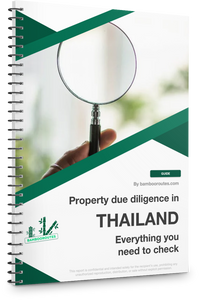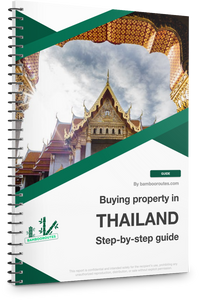Authored by the expert who managed and guided the team behind the Thailand Property Pack

Yes, the analysis of Bangkok's property market is included in our pack
If you're reading this, chances are you're captivated by Bangkok and are now considering purchasing property there.
But how exactly does the process work? Is it complicated? How long does it usually take? What’s the most complex part?
In this article, we'll guide you through every step.
Actually, we know this market inside and out. We keep tabs on it regularly, and all our discoveries are reflected in the most recent version of the Thailand Property Pack
The Steps to Buy a Condo in Bangkok
- 1) Research and Choose the Right Location
- Consider proximity to public transportation like BTS or MRT
- Evaluate neighborhood amenities such as shopping, dining, and schools
- Assess the area's potential for property value appreciation - 2) Understand Foreign Ownership Regulations
- Foreigners can own up to 49% of the total unit space in a condo building
- Ensure the condo building has available foreign quota
- Verify the developer's reputation and legal compliance - 3) Engage a Reputable Real Estate Agent
- Choose an agent experienced with foreign buyers
- Ensure the agent is familiar with Bangkok's property market
- Discuss your budget and preferences with the agent - 4) Conduct Due Diligence
- Review the condo's title deed and building regulations
- Check for any outstanding debts or encumbrances on the property
- Visit the property to inspect its condition and facilities - 5) Secure Financing and Transfer Funds
- Open a Thai bank account to facilitate fund transfers
- Transfer funds in foreign currency and convert to Thai Baht upon arrival
- Obtain a Foreign Exchange Transaction Form (FETF) for amounts over $50,000 - 6) Sign the Sales and Purchase Agreement
- Review the agreement with a legal advisor
- Ensure all terms, conditions, and payment schedules are clear
- Pay the deposit as stipulated in the agreement - 7) Complete the Transfer of Ownership
- Pay the remaining balance and associated taxes/fees
- Register the property at the Land Department
- Obtain the title deed in your name
Get the full checklist for your due diligence in Thailand
Don't repeat the same mistakes others have made before you. Make sure everything is in order before signing your sales contract.

What You Need to Know Before Buying a Condo in Bangkok
What are the legal requirements for foreigners buying a condo in Bangkok?
Foreigners can legally own a condo in Bangkok as long as the building's foreign ownership does not exceed 49% of the total floor area.
Buyers must provide a Foreign Exchange Transaction Form (FETF) for amounts over USD 50,000 to prove funds were remitted from abroad.
It's essential to ensure the condo is registered under the Condominium Act of Thailand to avoid legal issues.
How much should I expect to pay per square meter for a condo in Bangkok?
The price per square meter for a condo in Bangkok can vary significantly depending on the location and type of property.
In central areas like Sukhumvit or Silom, prices can range from THB 150,000 to THB 300,000 per square meter.
In more suburban areas, prices might be lower, ranging from THB 70,000 to THB 120,000 per square meter.
Want to explore this further?
What are the additional costs involved in purchasing a condo?
Besides the purchase price, buyers should budget for transfer fees, which are typically 2% of the property value.
There may also be a specific business tax of 3.3% if the property is sold within five years of purchase.
Other costs can include legal fees, which vary but are often around 1% of the property price.
Want to explore this further?
How long does the buying process typically take?
The process of buying a condo in Bangkok can take anywhere from 30 to 60 days, depending on the complexity of the transaction.
This includes time for due diligence, contract signing, and fund transfers.
Delays can occur if there are issues with documentation or if the foreign ownership quota is close to being exceeded.
What financing options are available for foreigners?
Foreigners can obtain financing from certain Thai banks, but the process can be complex and requires a significant amount of documentation.
Typically, banks offer loans up to 70% of the property's value, with interest rates varying based on the bank and the borrower's profile.
It's advisable to consult with a financial advisor or a local bank to understand the specific requirements and options available.
Buying real estate in Thailand can be risky
An increasing number of foreign investors are showing interest in Thailand. However, 90% of them will make mistakes. Avoid the pitfalls with our comprehensive guide.

Want to explore this further?
What are the common pitfalls to avoid when buying a condo in Bangkok?
One common pitfall is not verifying the developer's reputation and the project's legal status, which can lead to future legal and financial issues.
Another mistake is underestimating the total cost of ownership, including maintenance fees and potential special assessments.
Buyers should also be cautious of exchange rate fluctuations, which can affect the total cost if funds are transferred from abroad.
Want to explore this further?
How does the resale market for condos in Bangkok look?
The resale market in Bangkok can be competitive, with demand often focused on well-located and well-maintained properties.
Condos in prime areas tend to retain their value better, with annual appreciation rates of around 3% to 5%.
However, market conditions can fluctuate, so it's important to research current trends and consult with a local real estate expert.
What are the maintenance fees for condos in Bangkok?
Maintenance fees for condos in Bangkok typically range from THB 30 to THB 80 per square meter per month, depending on the building's amenities and location.
These fees cover the upkeep of common areas, security, and facilities like swimming pools and gyms.
It's crucial to review the condo's financial statements to ensure the building is well-managed and financially stable.
Are there any restrictions on renting out my condo?
Owners can rent out their condos, but it's important to check the building's regulations, as some may have restrictions on short-term rentals.
In general, leases should be for a minimum of 30 days to comply with Thai law regarding short-term rentals.
It's advisable to use a reputable property management company to handle rentals and ensure compliance with local laws.
What is the process for transferring ownership of a condo?
The transfer of ownership is conducted at the Land Department, where both the buyer and seller must be present or represented by a power of attorney.
All necessary documents, including the sale and purchase agreement, FETF, and identification, must be submitted for the transfer to be completed.
The process typically takes a few hours, but it's important to schedule an appointment in advance to avoid delays.
How can I ensure the condo I am buying is a good investment?
Researching the location, developer reputation, and market trends is crucial to ensure a good investment.
Consulting with local real estate experts and reviewing historical price data can provide insights into potential appreciation.
Additionally, considering the rental yield, which in Bangkok averages around 4% to 6%, can help assess the investment's viability.
Want to explore this further?
What are the tax implications of owning a condo in Bangkok?
Property owners in Bangkok are subject to a property tax, which is calculated based on the appraised value of the property.
For residential properties, the tax rate is generally 0.02% to 0.1% of the appraised value, depending on the property's use and value.
It's important to stay informed about any changes in tax laws and consult with a tax advisor to ensure compliance.
